This page contains the documentation for the Response Panels that were sold from 2016 to 2025: the Advanced Response Panel (Ag Panel) and the Universal Response Panel (Ug Panel).
The use of a Response Panel (Ag Panel or Ug Panel) is absolutely necessary for the following tests: COG, DT, INHIB, PP-R, RT, SIGNAL, STROOP, SWITCH, VIGIL, WAF, WAFV, ZBA.
If you also want to test eye-hand coordination with the 2HAND and SMK tests, the Universal Response Panel (Ug Panel) is required. Please note: Test forms S3 and S4 of the 2HAND can also be administered with the Advanced Response Panel (Ag Panel).
All other tests in the VTS do not require a Response Panel. However, many tests can still be administered using the Response Panel to avoid having to change input devices (e.g., from a PC keyboard to a Response Panel).
Scope of delivery
-
1 Response Panel, Advanced (Ag) or Universal (Ug)
-
2 joysticks (only with Ug Response Panel)
-
2 joystick templates (only with Ug Response Panel)
Advanced Response Panel
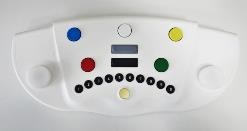
-
7 color keys, 10 number keys, 1 sensor key
-
2 control knobs
-
Connection options for foot-operated keys
-
Connection options for foot pedals - analog
-
Sound generator (speaker)
-
Connection option for headphones and microphone (jack plug)
Universal Response Panel
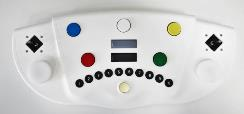
-
7 color keys, 10 number keys, 1 sensor key
-
2 control knobs
-
2 analog joysticks
-
Joystick templates
-
Connection options for foot-operated keys
-
Connection options for foot pedals - analog
-
Sound generator (speaker)
-
Connection option for headphones and microphone (jack plug)
Startup
Use the supplied USB cable to connect the response panel to the PC used for testing. The Vienna Test System (or the Testplayer) must be installed on this PC. Connect the USB cable to the USB-B socket on the back of the Response Panel and the other end to a free port (USB-A socket) on your computer.
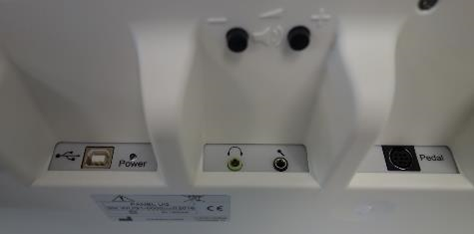
Joystick guides
The joystick guides are attached to the Response Panel Ug as shown. The joystick can be removed for easier installation.
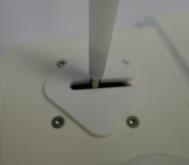
Joystick guides are used in some tests to limit the joystick's freedom of movement to a specific direction. The following symbols are used in the instructions for these tests.
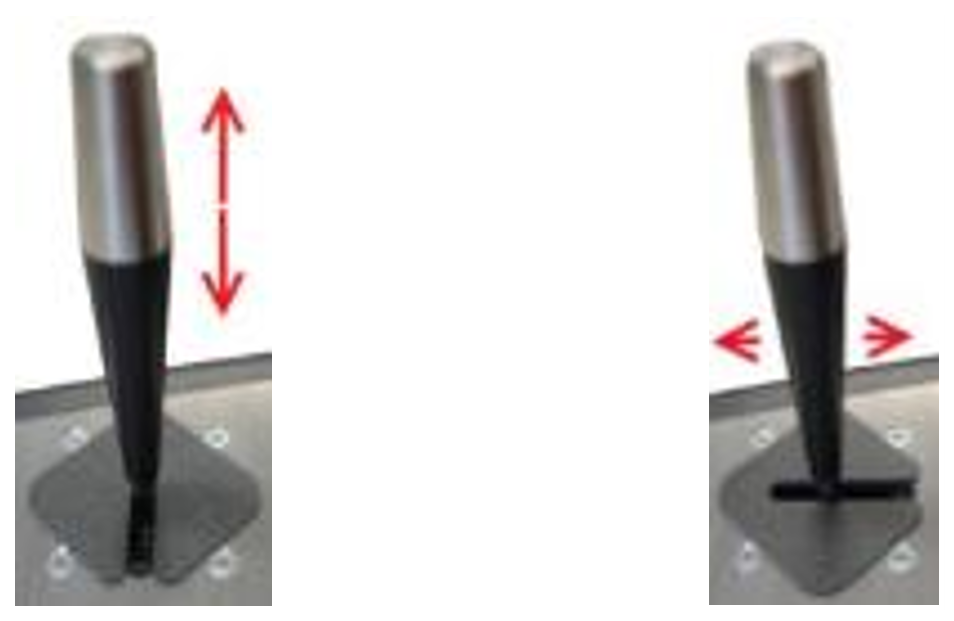
Sound input and output
In the Vienna Test System, sound output can be selected via the internal loudspeaker or via a headset (available as an accessory). The headset can be connected to the Response Panel using a 3.5 mm jack plug for headphones and a microphone. The sockets for connecting the headset are marked with a headphone and microphone symbol. If you want to use a USB headset, connect it to a free USB port on the computer. When the headset is connected, the internal speaker of the Response Panel is switched off.
The volume can be adjusted using the (+) and (-) buttons on the back of the Response Panel, but cannot be turned down to zero.
Foot-operated keys and foot pedals
Foot-operated keys or foot pedals (available as accessories) are connected via a single connection socket. The socket is marked with the label Pedal. Connect the foot-operated keys or foot pedals as required.
Specifications
Specifications
|
Value |
|---|---|
|
Power supply |
+5V DC via the USB cable |
|
Power consumption |
max. 500mA |
|
Protection class |
|
|
Device type |
B |
|
Max. USB cable length |
3m |
|
Max. headset cable length |
3m |
|
Max. dimensions (W/H/D) |
495 x 50 x 230mm |
|
Weight (without accessories) |
1,495kg |
|
Storage temperature |
-20 to 60°C |
|
Operating temperature |
10 to 30°C |
|
Relative humidity |
max. 70%, non-condensing |
